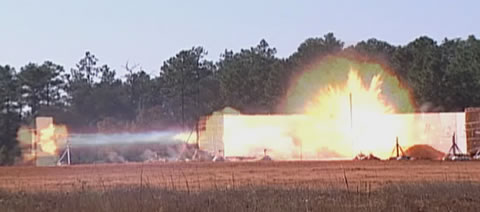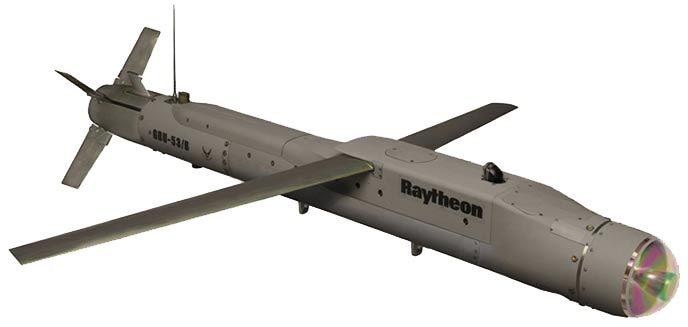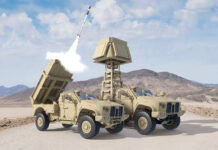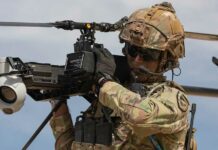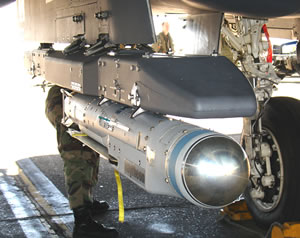
The U.S. Air Force has awarded the Raytheon Company (NYSE: RTN) US$450 million for the development and production of GBU-53/B for the Small Diameter Bomb increment II program. SDB II is the next generation of the lightweight, aerial precision-strike standoff weapon designed with the integral capability to accurately strike moving and fixed targets in adverse weather conditions.
Raytheon has developed an all-new, streamlined bomb casing and folding swept-wing for the new weapon, departing from the MBDA designed ‘Diamond Back’ configuration used by the Boeing designed the first generation SDB. Raytheon will begin producing the new weapons in 2013 with initial deliveries completing the first production lot by late 2014.
The GBU-53/B incorporates a three-modal seeker featuring millimeter-wave radar, a semi-active laser (SAL) and an uncooled imaging infrared. The use of an uncooled thermal imager is a unique implementation of such sensor in aerial weapons, demonstrating the maturity and high resolution achieved with bolometric technology.
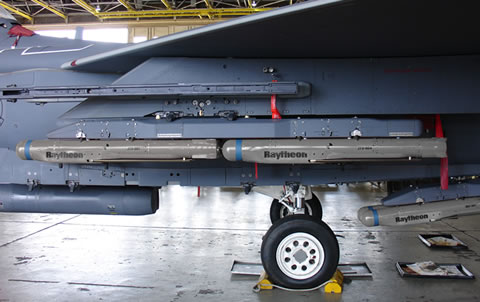
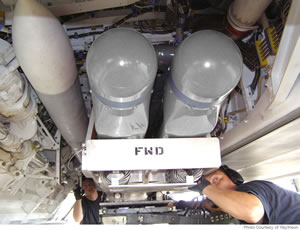
“Our uncooled IIR seeker met all the warfighter’s requirements and reduced the weapon’s total life-cycle cost and logistics footprint,” said Dr. Taylor W. Lawrence, Raytheon Missile Systems president. The tri-modal terminal seeker is a derivative from the seeker systems used in the 120mm Medium Range Munition for the M-1A2 tank and the canceled XM-501 Precision Attack Missile. For the warhead, Raytheon opted for the newly developed ‘multi-effect warhead’. Originally, Raytheon adapted the warhead used in the SDB Increment I weapon, but in parralel, decided to develop another warhead optimized for the services’ requirements. “This new warhead used a plasma jet [created by the shaped charge] to penetrate armor, it could stop a tank and in many cases also destroy it. We also improved blast-fragmentation effects by scoring the case design. It was so effective, Air Force engineers dubbed it ‘the shredder.'” said Harry Schulte, Vice President, Air Warfare Systems at Raytheon blogging on Aviation Week. “By changing the weapon’s length, our design team had the opportunity to repackage the seeker electronics in a way that improved affordability and producibility, while providing a clear path for the plasma jet,” Schulte added.

The selection followed a successful technology demonstration program, during which the company tested and verified that its form factored tri-mode seeker could seamlessly transition between modes. The GBU/53-B seeker proved its reliability during flight testing when it flew 26 missions in 21 days without a single hardware failure. Test flights during the risk reduction phase included separation, subsystems deployment and operation, autopilot functions and navigation. Fit checks were also conducted at Langley AFB, on the F-22 Raptor, verifying that the Raptor can carry eight weapons in its internal weapons bay, along with two AMRAAM missiles. All versions of the F-35 will also be able to carry eight GBU-53/Bs and two AMRAAMS in the internal weapons bay. Fitting the weapon into these internal bays was not easy, said Schulte. “we needed to shorten the weapon’s length in order to meet the government requirements to carry eight weapons in the Marine Corp’s Short Takeoff and Vertical Landing F-35B Joint Strike Fighter. Without reducing the weapon’s length, the F-35B would be limited to six internal weapons, instead of the desired eight weapons.
